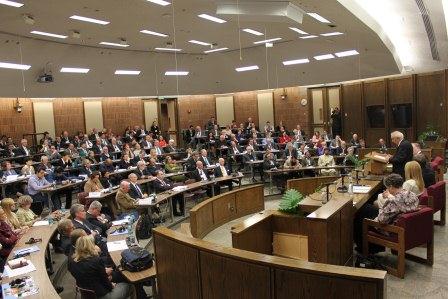19th Annual International Law and Religion Symposium: The Opening Session

The 19th Annual International Law and Religion Symposium opened as delegates, invited guests, hosts, students, and mbmers of the university community, as well as viewers worldwide who were able to access the live Internet stream, heard keynote addresses by Professor Silvio Ferrari, Ambassador Suzan Johnson Cook, and Commissioner Katrina Lantos Swett.
Silvio Ferrari, Professor of Canon Law at the University of Milan and Professor of Church-State Relations at the University of Leuven in Belgium, spoke about the meaning of the secular state, proposing that it originally grew from the Christian legal tradition based on divine natural law. In a way, said Professor Ferrari, the origin of the modern secular state is still tied to Christian theological concepts, raising two significant questions. One, is the western secular state a model that can be exported beyond the Christian West? Can it be a valuable type of state for the Arabic countries? And, two, is the secular state still able to answer the needs of Western societies that have become less Christian and more religiously plural? In order to find the solution, each civilization must search within its own culture and tradition and find what works for them, Professor Ferrari proposed. “There are different roles,” he said, “but all are acceptable if they converge on the common goal of ensuring religious freedom and equal treatment, which are fundamental rights of every human being.”
Suzan Johnson Cook, U.S. Ambassador at Large for International Freedom focused her remarks on current threats to religious freedom, and how government and civil society can work together to condemn hatred and violence and encourage peace and mutual respect. “Despite some progress, the overall state of religious freedom in the world is really sliding backward,” Ambassador Cook said. “Members of faith communities around the world that have long been under pressure report that that pressure is growing.” Although many countries allegedly restrict religious freedom to ensure safety and counter violent extremism, a lack of religious freedom weakens social cohesion and alienates citizens from their government fomenting internal unrest, breeding extremism, and inhibiting national unity and progress. In addition to diplomatic and policy approaches, the government uses other types of programming as appropriate to advance religious freedom. Currently, in the Bureau of Democracy, Human Rights and Labor, 10 million dollars of foreign assistance funds is managed to provide conflict mitigation and training to local civil society organizations. “It’s important for us to partner with civil society, as well as with governments to help religious freedom and democracy to flourish around the world,” Ambassador Cook emphasized.
Dr. Katrina Lantos Swett, Chair of the United States Commission on International Religious Freedom (USCIRF), was the concluding keynote speaker at the opening session of the Religion Symposium. She addressed the topic of religious freedom both from the perspective of USCIRF and also from the perspective of how faith and religion impact the character of the societies we build. “The work we are engaged in, namely the defense of freedom of conscience and belief, is no mere sideline issue,” Dr. Swett noted early on. “Many of the most vexing and dangerous issues confronting our world stem from a failure on the part of countries and cultures to fully and equally protect this right, and its essential companion and antecedent, namely the right of free expression.”
In referring to how faith and religion impact the character of our societies, Dr. Swett concluded, “We are not simply fighting for the right of people within their own lives and within their own hearts to pursue truth as they believe it, to live out their conscience. But, I believe we are empowering them to become the kind of people … that will enable them to build the communities, the countries, the culture and the world that we all dream of.”